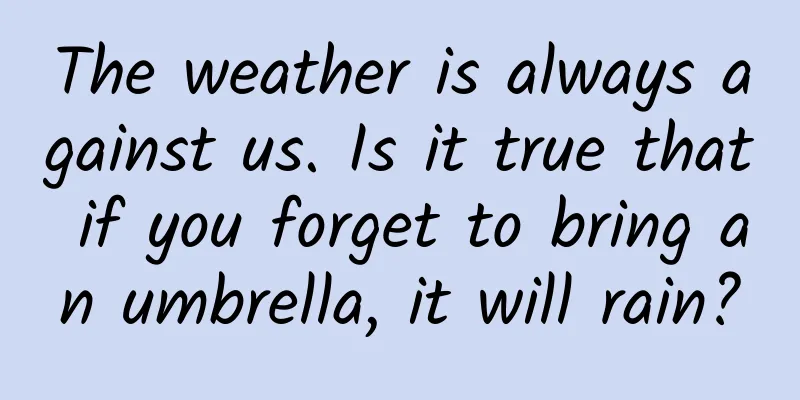The weather is always against us. Is it true that if you forget to bring an umbrella, it will rain?

|
Audit expert: Zhan Mingjin PhD, Chinese Academy of Meteorological Sciences Audit expert: Taozi National Psychological Counselor Perhaps in daily life, everyone has this feeling: when you get up in the morning and see the weather forecast shows that it will rain, you bring an umbrella before going out, but eight or nine times out of ten, you don’t use it. On the contrary, if you forget to bring an umbrella one day, it will rain after you go out, and you will be soaked like a drowned chicken . Many people can resonate with such things. What is the reason behind it? Is it because the accuracy of the weather forecast is not high enough? Not only that, some friends also mentioned "Murphy's Law". What is Murphy's Law? What impact does it have on our lives? 1 The history of weather forecast Speaking of weather forecast, I believe everyone is familiar with it. When we began to understand the world, weather forecast had already become a "natural" part of life. The existence of weather forecast seems to be natural, but if you delve into its history, you will find that it is actually a very "young" field. Although the Chinese have the habit of observing the weather since ancient times, and have even summarized some rules. However, this can only provide some reference for people to speculate on future weather, and cannot be specific to the exact moment. It was not until the Norwegian school in the 19th century that humans began to observe the weather systematically , but the work at this stage can only be regarded as the prototype of weather forecasting. It was not until the 1950s that science and technology developed further, and weather forecasting was supported by computers and modern detection technology, and its accuracy was improved . In modern society, people enjoy the convenience brought by weather forecasts, which is inseparable from various advanced detection methods, including meteorological satellites, weather balloons, weather radars, ground observation stations , etc. Meteorological satellites are artificial satellites that conduct meteorological observations of the earth and its atmosphere in space. They are modern products that integrate high technologies such as space, remote sensing, computers, communications and control. Meteorological satellite cloud images are important observation products of meteorological satellites. They are distribution maps of clouds in the earth's atmosphere taken by meteorological satellites. Cloud images can be used to analyze and predict the trend of cloud changes. They are mutually verified with the results observed by ground observation stations and constitute an important part of forecasting weather changes. Weather balloons generally work at an altitude of 35 kilometers from the ground. As a supplement to high-altitude detection methods such as meteorological satellites, weather balloons can observe meteorological elements such as atmospheric temperature, air pressure, humidity, wind direction and speed, and atmospheric composition . They have the advantages of low production cost and flexible and convenient operation. A variety of detection methods work together at different heights and directions to form a modern and complete meteorological observation system. Source of Fengyun meteorological satellite | Screenshot of CCTV News Of course, weather forecasts cannot be 100% accurate, and deviations are inevitable, one of which is time deviation . For example, the weather forecast says it will rain tomorrow morning, but there is a deviation, and it starts to rain around sunrise, and by the time we go out, the rain has stopped; or the forecast says it will rain in the afternoon, but it starts to rain after nightfall, and we are already asleep at this time and may not notice it. At this point, you may still have questions. How can we explain the fact that the weather forecast is very different from the actual weather? This is related to a psychological effect: Murphy's Law. 2 The mysterious "Murphy's Law" Some college students have studied probability theory and are probably familiar with "Murphy's Law". In statistics, the probability p of an event happening is between 0 and 100% (that is, 1), so the probability of it not happening is 1-p. Among n possible time points where this event may happen, the probability of at least one of them happening is P=1-(1-p)ⁿ. It can be seen that when the number of experiments n tends to infinity, pn will tend to 1, which means it becomes an inevitable event. In real life, no matter how small the probability of an event happening is, as long as time is long enough, it will happen one day , which will cause serious consequences. Obviously, the fact that "weather forecast is inaccurate" meets the conditions of "Murphy's Law" very well. The accuracy of weather forecasts cannot reach 100%, but generally speaking, the accuracy of China's weather forecasts is above 85%. The accuracy of forecasts in developed countries such as the United States, Europe, and Japan is also roughly in the range of 85%-90%, and the inaccuracy of forecasts is also above 10%. Therefore, it is almost inevitable that "today's weather forecast is inaccurate" will happen after a long time . In addition, the feeling of being soaked in the rain is not pleasant, enough to make us remember it for a long time, which leads us to "take one time as a hundred times", only remembering the feeling of being rained on, and forgetting that it may have been a long time since the last time we were rained on. We always say things like "happy times are short" and "that period was really hard to endure". But in reality, how can the speed of time change because of our likes and dislikes? This is because different things leave different impressions in our minds due to different moods at the time. So, next time you want to complain about the inaccurate weather forecast that caused you to get wet in the rain, you might as well stop and think about when was the last time you got wet in the rain. If you only remember the feeling of getting wet in the rain but forget the specific time, then it may have been a long time ago. Source | Photo Network 3 Will running get you less wet than walking? Now, suppose we are really unlucky and encounter a rainy day, then should we "run as fast as we can" or take a walk in the rain with the mentality of "I'm already soaked, so I might as well walk back"? In the context of "it's raining heavily", what we encounter is usually not drizzle. Relevant data shows that on rainy days when people need to run to avoid rain, the vertical speed of raindrops is above 2m/s in most cases. At this speed, the time it takes for raindrops to reach the ground from our heads is actually very short. Therefore, for some people who are worried that their bodies may encounter more raindrops when running, the difference between this situation and walking can be basically ignored . Then, the main influencing factor is the time spent in the rain. Obviously, running can shorten this time. Therefore, if you encounter a bit of heavy rain and the destination is relatively close, running is also an option . After all, getting wet occasionally is inevitable in life. On the one hand, it reminds us to plan ahead, and on the other hand, it also tells us that only by accepting the sudden wetness can we have the opportunity to welcome unexpected surprises. This is life, right? |
<<: What else does circadian rhythm affect besides sleep?
>>: If you just keep eating and eating, maybe you can "save the world"?
Recommend
It is said that the 5G version of iPhone will use ultrasonic under-screen fingerprint technology
According to foreign media macrumors, Apple plans...
Kuaishou live streaming sales operation skills: How to efficiently carry out live streaming sales
Everyone envies the live streaming sales capabili...
Disposable underwear was exposed by the "3.15" evening party! How to avoid choosing unhygienic disposable underwear?
Disposable underwear is favored by tourists, peop...
Washing dishes this way increases bacteria by 70 times! All of them are eaten by the stomach...
In daily life Many people have this habit at home...
The college entrance examination has been held in July for more than 20 years. Why was it changed to June?
Author: Yuan Shuo, Gao Yuxing, Zhan Mingjin Profe...
[Smart Farmers] Are all colorful fruits and vegetables genetically modified foods?
[Smart Farmers] Are all colorful fruits and veget...
The latest Android app market contacts and event application materials (updated in June 2017)
A complete collection of contact information for ...
Influenza is prevalent in autumn and winter. How to distinguish between COVID-19, the common cold and influenza?
On November 5, at the press conference of the Joi...
Civil engineering engineer renovation construction entry to master
Civil engineering engineer renovation constructio...
After getting a marriage certificate and having a child, what kind of game is Youpengpule playing with China News Media?
On August 4, China News Media released the latest...
How much does it cost to develop the Foshan drinking water reminder mini program and the drinking water alarm mini program?
According to statistics, the amount of water a per...
Spicy kiwi? More weird flavors
Produced by: Science Popularization China Produce...
The hint method of user operation: How to hook your users at the beginning of product development?
There are two aspects to this: satisfying intrins...
How to borrow money using social security card? Social Security Card Loan Process
How to borrow money using social security card? T...
Online influencers selling products will soon be eliminated, and street stalls are the new traffic entrance for short videos!
Why do we say that the online celebrity purchasin...









